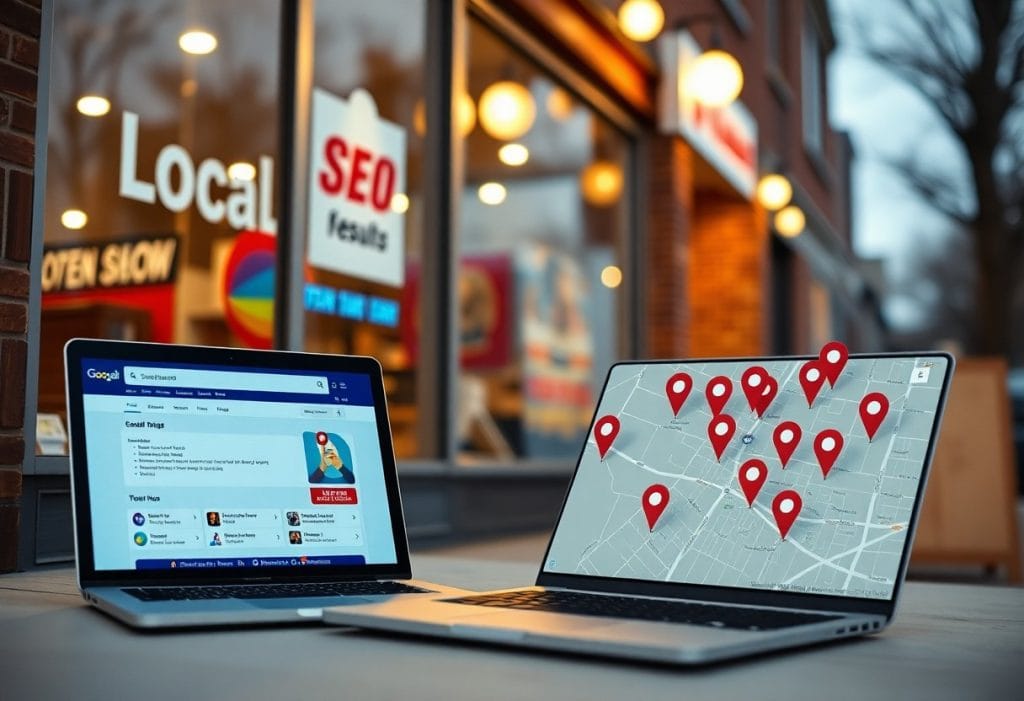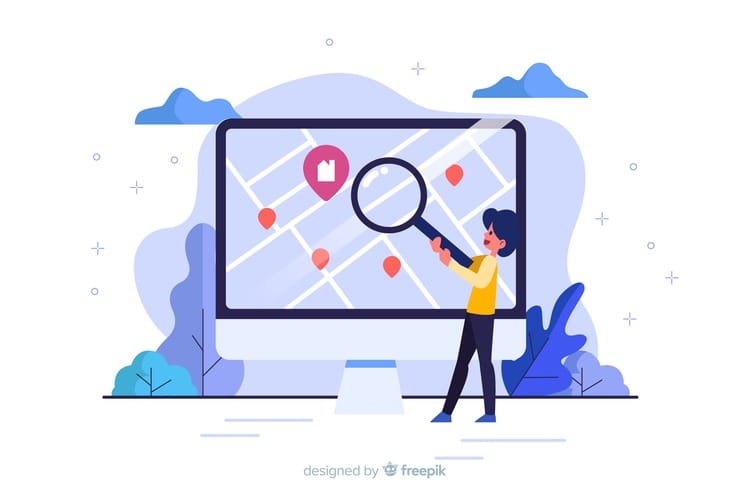Want to reach more customers for your local business? While traditional marketing has its place, online marketing is key to expanding your reach and attracting new clientele. This blog post dives into proven online strategies designed specifically for local businesses. We will also showcase valuable tools and share real-world examples to help you implement these strategies effectively.

Why Online Marketing is Important for Local Businesses
1. Reach a Local Audience
Online marketing allows local businesses to target potential customers in their geographic area. This can lead to increased foot traffic and local sales.
2. Cost-Effective Advertising
Compared to traditional marketing methods, online marketing offers cost-effective solutions. Small businesses can achieve significant results with a limited budget through targeted digital advertising.
3. Build Customer Relationships
Online marketing provides various platforms for businesses to engage with their customers, gather feedback, and build lasting relationships.
4. Gain Valuable Insights
Digital marketing tools offer valuable data and analytics, helping businesses understand customer behavior, preferences, and trends to make informed decisions.
Key Online Marketing Strategies for Local Businesses

1. Optimize Your Website for Local SEO
Importance of Local SEO
Local SEO helps your business appear in local search results, increasing visibility to potential customers in your area. It involves optimizing your website and online presence to rank higher in search results for location-based queries.
Local SEO Best Practices
- Keyword Research: Identify and use local keywords relevant to your business.
- Google Business Profile: Create and optimize your Google Business Profile with accurate business information, photos, and customer reviews.
- Local Listings: Ensure your business is listed in local directories and review sites like Yelp and TripAdvisor.
- NAP Consistency: Maintain consistent Name, Address, and Phone Number (NAP) information across all online platforms.
- Localized Content: Create content that addresses local events, news, and interests to engage your community.
Tools for Local SEO
- Google Business Profile (previously Google My Business): Essential for managing your Google Business Profile and appearing in local search results.
- Moz Local: Helps manage local listings and ensure NAP consistency across the web.
- BrightLocal: Provides tools for local SEO audits, rank tracking, and review management.
2. Leverage Social Media Marketing
Importance of Social Media
Social media platforms like Facebook, Instagram, and Twitter offer powerful ways to connect with local customers, build brand awareness, and promote your products or services.
Social Media Best Practices
- Engaging Content: Share high-quality images, videos, and posts that resonate with your local audience.
- Local Hashtags: Use local hashtags to increase the reach of your posts to the community.
- Customer Interaction: Respond to comments, messages, and reviews promptly to build relationships with customers.
- Social Media Ads: Use targeted social media ads to reach specific demographics in your area.
Tools for Social Media
- Hootsuite: A social media management tool for scheduling posts, monitoring engagement, and analyzing performance.
- Buffer: Helps manage multiple social media accounts, schedule posts, and track analytics.
- Canva: A graphic design tool for creating visually appealing social media content.
3. Utilize Online Reviews and Reputation Management

Importance of Online Reviews
Online reviews significantly influence potential customers’ decisions. Positive reviews can enhance your business’s reputation, while negative reviews need to be addressed promptly and professionally.
Reputation Management Best Practices
- Encourage Reviews: Ask satisfied customers to leave reviews on platforms like Google, Yelp, and Facebook.
- Monitor Reviews: Regularly check review sites and social media for new reviews.
- Respond to Reviews: Respond to both positive and negative reviews to show that you value customer feedback.
- Learn from Feedback: Use customer feedback to improve your products, services, and overall customer experience.
Tools for Reputation Management
- Reputation.com: Provides tools for managing online reviews and customer feedback.
- BirdEye: Helps businesses collect, monitor, and respond to online reviews.
- ReviewTrackers: A review management tool for tracking and responding to online reviews.
4. Implement Email Marketing Campaigns
Importance of Email Marketing
Email marketing is a cost-effective way to stay connected with your customers, promote your products or services, and drive repeat business.
Email Marketing Best Practices
- Build an Email List: Collect email addresses through your website, social media, and in-store promotions.
- Segment Your List: Segment your email list based on customer behavior and preferences to send targeted messages.
- Personalize Emails: Personalize emails with the recipient’s name and tailor content based on their interests.
- Automate Campaigns: Use automated email sequences for welcome emails, promotional offers, and follow-ups.
- Measure Performance: Track open rates, click-through rates, and conversions to optimize your email campaigns.
Tools for Email Marketing
- Mailchimp: A popular email marketing platform offering tools for creating, sending, and analyzing email campaigns.
- Constant Contact: Provides email marketing services, including templates, automation, and analytics.
- Klaviyo: An email marketing platform specifically designed for e-commerce businesses, offering advanced segmentation and automation.
5. Invest in Pay-Per-Click (PPC) Advertising

Importance of PPC Advertising
PPC advertising can drive targeted traffic to your website quickly. With PPC, you only pay when a user clicks on your ad, making it a cost-effective way to reach potential customers.
PPC Best Practices
- Keyword Targeting: Use relevant keywords to ensure your ads reach the right audience.
- Ad Copy: Create compelling ad copy that encourages users to click on your ads.
- Landing Pages: Design optimized landing pages that match the ad content and provide a clear call to action.
- A/B Testing: Continuously test and refine ad copy, keywords, and landing pages to improve performance.
Tools for PPC
- Google Ads: The most popular PPC platform, offering extensive reach and targeting options.
- Bing Ads: A PPC platform that allows you to reach users on the Bing search engine.
- WordStream: Provides tools for managing and optimizing PPC campaigns across multiple platforms.
6. Create Valuable Content
Importance of Content Marketing
Content marketing involves creating and sharing valuable content to attract and engage your target audience. It helps in building brand authority, driving organic traffic, and nurturing leads.
Content Marketing Best Practices
- Blogging: Regularly publish informative and relevant blog posts that address the needs and interests of your audience.
- Video Content: Create engaging video content, such as product demos, tutorials, and customer testimonials.
- User-Generated Content: Encourage customers to create and share content featuring your products.
- SEO Optimization: Optimize content with relevant keywords to improve search engine rankings.
Tools for Content Marketing
- HubSpot: An all-in-one marketing platform offering tools for content creation, SEO, and analytics.
- BuzzSumo: Helps in identifying popular content and trends in your industry.
- Canva: A graphic design tool for creating visually appealing content, including social media graphics and infographics.
7. Utilize Influencer Marketing
Importance of Influencer Marketing
Influencer marketing leverages the reach and credibility of social media influencers to promote your products. It helps in building brand awareness and driving sales through authentic recommendations.
Influencer Marketing Best Practices
- Identify Influencers: Choose influencers whose audience aligns with your target market.
- Build Relationships: Foster genuine relationships with influencers to create authentic content.
- Track Performance: Monitor the performance of influencer campaigns and measure ROI.
- Disclosure: Ensure influencers disclose their partnership with your brand to maintain transparency.
Tools for Influencer Marketing
- Influence.co: A platform for finding and managing influencer partnerships.
- AspireIQ: Provides tools for influencer marketing campaigns, including discovery, management, and analytics.
- Upfluence: An influencer marketing software offering influencer search, outreach, and campaign management.
Conclusion
Marketing your local business online is essential for attracting new customers and staying competitive in today’s digital age. By implementing the right strategies, local businesses can increase visibility, drive traffic, and build lasting customer relationships. Whether you’re optimizing for local SEO, leveraging social media, managing online reviews, or creating valuable content, the key is to stay consistent and adapt to changing trends.
At Digital Sprig, we specialize in helping local businesses thrive online. Our team of experts can assist with everything from SEO and social media management to email marketing and PPC advertising. Contact us today to learn how we can help your business succeed in the digital world.







